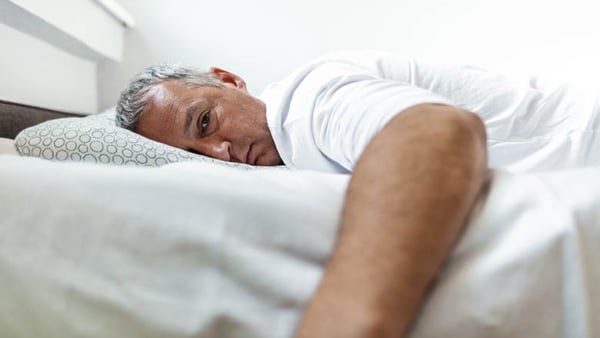Losing Sleep to Nocturia? It Might Be Your Prostate’s Fault

Waking up to pee in the middle of the night is not a big deal until it is. For men, what may be getting bigger is their prostate, and its growth can interrupt a restful night’s sleep.
Waking up twice or more each night to go to the bathroom is a condition called nocturia. Nocturia impacts men and women, and it can have many causes, from drinking too much before bed to medications that contain diuretics.
Certain health conditions also contribute to nocturia. For men, one of the most common nocturia culprits is benign prostatic hyperplasia or enlarged prostate.
The Prostate
The prostate gland is about the size of a walnut and sits at the base of the bladder, behind the penis. The urethra, the tube that carries urine out of the body, runs down the center of the prostate. A man’s prostate grows throughout his adult life, but if it grows too large, it can compress the urethra and make it more difficult to pee.
If a man’s prostate enlarges to the point it is causing bothersome lower urinary tract symptoms, he will be diagnosed with benign prostatic hyperplasia or BPH.
Benign Prostatic Hyperplasia (BPH)
BPH is incredibly common, impacting half of US men by the age of 60. BPH is the leading reason men visit a urologist. It’s important to note that BPH is NOT cancer. It is benign.
Nocturia is just one symptom of BPH. Men who have BPH may experience nocturia or other symptoms like:
- Frequent need to urinate both day and night
- Weak or slow urinary stream
- Feeling that you cannot completely empty your bladder
- Difficulty or delay in starting urination
- Urgent need to urinate
- A urinary stream that starts and stops
But nocturia is one of the more common symptoms and one of the most distressing to patients when they can’t get a good night’s rest.
Untreated BPH Can Progress
The health effects of a poor night’s sleep have been well documented: memory issues, mood changes, trouble thinking or concentrating, weight gain, weakened immunity, high blood pressure, increased risk of diabetes, and reduced sex drive, to name a few.
The results of untreated BPH are equally alarming to many men.
- Adult diapers. If the urethra is closed off, the bladder must contract harder to push urine out. Over time, this weakens the bladder and can lead to incontinence.
- Urinary catheter. If your urethra becomes too obstructed or if bladder weakness becomes too severe, a catheter may be needed to drain the bladder fully.
- Urinary Tract Infections (UTIs) and Kidney Stones. If your bladder isn’t fully draining, the residual urine left increases the risk of UTIs and kidney stones.
- Kidney damage. The kidneys are attached to the bladder through two ureters, the ducts through which urine passes. If urinary retention causes pressure on the bladder, it could eventually damage the kidneys. Also, if the bladder is infected, that infection could spread to the kidneys.
Don’t Lose Sleep; Care is Easier Than You Think
BPH can be treated with conservative management or behavior modification if caught early. This may include limiting beverages in the evening, limiting caffeine and alcohol consumption, avoiding bladder-irritating foods, and avoiding certain medications that can impact urination.
A urologist can also prescribe medications to help urine flow better and shrink the size of the prostate.
For more severe urinary symptoms related to advanced cases of BPH, there are minimally invasive, office-based procedures now available as alternatives to surgery.
The important thing is not to ignore nocturia or any of the symptoms of BPH. Sound sleep comes when you make health a priority.
Wondering if your symptoms could be BPH? Take our BPH Symptom Quiz and learn more about BPH symptoms, diagnosis, and treatment.

